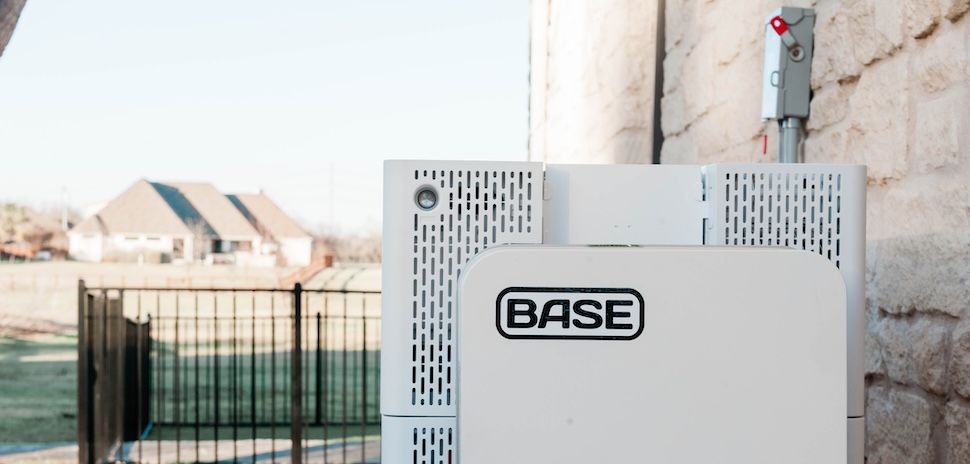Texas has seen its share of energy struggles, however the newest one isn’t political—it’s about who controls the way forward for residence vitality. Simply 4 months after raising $200 million in Series B funding, Austin-based Base Energy is already eyeing a $4 billion valuation because it seems to be to scale its grid-connected residence batteries throughout the state and past, The Info reported Friday.
Based in June 2023 by Zach Dell—son of Dell Applied sciences founder Michael Dell—and Justin Lopas, Base Power is pitching itself as America’s next-generation energy firm. Its wager: distributed residence batteries, put in cheaply in homes throughout Texas, that double as a private backup system and a collective pressure for stabilizing the state’s fragile grid.
How Base Energy Works
As a substitute of promoting batteries outright like Tesla does with its Powerwall, Base Energy installs lithium iron phosphate batteries—normally 20–30 kWh—in buyer properties with nearly no upfront value. Owners pay a one-time set up price of $495 to $2,000, plus round $16 a month, and commit to purchasing electrical energy from Base Energy at aggressive charges. In return, they get backup energy throughout outages that may maintain the lights on for a full day, whereas Base Energy aggregates these batteries into a large digital energy plant.
This VPP mannequin permits Base Energy to take part in Texas’ wholesale vitality markets by charging batteries when electrical energy is reasonable and discharging when costs spike. It’s arbitrage at grid scale, however with shopper advantages baked in. As co-founder Zach Dell put it, “We’re promoting you extra reasonably priced, extra dependable energy… with extra reasonably priced pricing and a battery to guard your property from energy outages.”
That proposition seems to be particularly engaging in Texas, the place blackouts and worth volatility are now not uncommon occasions. Not like many conventional suppliers, Base Energy is vertically built-in—dealing with set up, operations, and upkeep itself—making the client expertise extra easy than rivals that lean on third-party contractors.
Progress and Funding

Base Energy has been shifting quick. Since its business launch in Could 2024, it’s gone from serving just a few cities outdoors Austin to greater than 70 municipalities, together with Houston and Dallas, with an NPS rating round 80. Installations jumped from one per week to twenty a day, and the corporate deployed over 10 MWh of storage in a single month this summer season.
Backed by Addition, Andreessen Horowitz (a16z), Lightspeed, Valor Fairness Companions, Thrive Capital, and others, the $200 million Sequence B introduced in April 2025 is fueling that scale-up. Traders like Lee Fixel of Addition and Antonio Gracias of Valor have already joined the board. The corporate is constructing a manufacturing unit close to Austin to fabricate 1000’s of batteries weekly and goals to put in the equal of a utility-scale plant—100 MWh—by mid-2025.
Partnerships have helped speed up adoption. Base Energy struck a take care of Lennar to combine batteries into new properties and launched a pilot with Bandera Electrical Cooperative, the place the utility pays for dispatchable capability from Base’s distributed fleet. These fashions give the corporate a playbook for coming into regulated markets outdoors Texas.
The Push for $4 Billion
Base Energy is now in talks to boost as a lot as $1 billion at a $4 billion valuation, a part of a broader wave the place battery startups are chasing lofty worth tags, snapping up distressed property, and leaning on AI for an edge. That may mark a twentyfold bounce over its Sequence B valuation, reflecting the extraordinary investor urge for food for vitality storage as AI information facilities, electrical automobiles, and renewable vitality pressure present grids.
“Texas-based Base Energy is in search of a $4B valuation because it scales residence battery installs tied to the grid,” The Info reported.
The flood of capital raises a well-known query: will these performs result in lasting earnings—or simply gasoline the hype cycle?
For Base Energy, the corporate’s pitch is that its vertically built-in mannequin can scale quicker than rivals, that its software program makes sub-second fleet administration potential, and that Texas’ deregulated market is the right testbed. If it may possibly show out the economics and reliability, the upside may very well be big—not only for the corporate, however for a grid struggling below the load of electrification.
Trying Forward
Base Energy’s problem is {hardware} scale-up—thermal administration, provide chain, and manufacturing are by no means straightforward on this enterprise. But when the corporate hits its targets, it might shortly develop into one of many largest distributed storage suppliers within the U.S.
As Lopas described it, the objective is a “deployment manufacturing unit” the place all the pieces from signup to set up is streamlined. That’s how Base Energy believes it may possibly flip a younger startup right into a multi-billion-dollar pressure in vitality.
And in a state the place the grid can fail with little warning, the concept of dependable, reasonably priced backup energy is greater than only a nice-to-have—it’s survival.
🚀 Need Your Story Featured?
Get in entrance of 1000’s of founders, traders, PE corporations, tech executives, resolution makers, and tech readers by submitting your story to TechStartups.com.






